Gordon Hayward and Marcus Smart offer recovery route for Boston Celtics in Eastern Conference Finals
Written by News on 25/09/2020
The Boston Celtics need Gordon Hayward to step up and Marcus Smart to tone down his bad offensive habits if they are to find a recovery route against the Miami Heat.

Down 3-1 in the Eastern Conference Finals against a rampant Miami Heat, the Boston Celtics head into what could – and for them, must – be the first of three do-or-die elimination games. You would think that if we were to focus on any one Celtic player, then, it would therefore be on their offensive stars, and particularly Jayson Tatum.
- Bam Adebayo: Miami Heat don’t care who gets the glory
- Miami Heat hail Tyler Herro’s ‘uncommon fearlessness
Certainly, Tatum’s performances are vital if Boston are to have any chance here, and he was noticeable by his absence in half of Game 4. Although he ultimately finished with 28 points, Tatum was scoreless at half time, a half in which the Celtics fell into a hole they never got out from.
Despite all our laudatory praise for him and his ascent to stardom so young in his career during the hard-fought Eastern Conference semi-final series victory over the defending champion Toronto Raptors, Tatum came out flat, looking sloppy offensively and not fully engaged defensively, to a greater degree than can simply be credited to Miami’s defense on him. He needs to do more, and, based on his post-game comments, he knows that too.
Instead, let us look at two of the Celtics’ main five, and what they need to do if Boston are to turn this series around.
To be fair to Gordon Hayward, his performance in Game 4, and even his very presence in the series right now, is admirable considering that his wife is currently outside the bubble giving birth to their child.
Hayward had 14 points, seven rebounds, three assists and only one turnover in 29 minutes of game four, not at his most crisp in what was only his second game after a month away from the team through injury, yet with a decent statistical showing overall.
Marcus Smart, however, fell back into bad habits. He finished the game with a 10-point, 11-assist double-double and offered his usual feisty defense, yet he shot only 3-of-12 from the field, including 1-of-8 from three-point range, and recorded four turnovers. Those were not eight good three-point attempts, either, and nor were they four clean takeaways for turnovers by the defense.
Smart has always had a tendency to force things, and although he has improved as a shooter in the last couple of years, his shot selection is still spotty. At a time that an incredibly disciplined Miami Heat team were demanding that the Celtics play perfectly, he didn’t.
Theoretically, these two add plenty of dimensions of the team. In theory, Smart is the Swiss Army knife in the backcourt, and Hayward is one in the frontcourt, with each half of the pairing able to fill whatever role is needed.
Hayward can shoot, cut, roll and float off the ball as well as take his turns on it when required, further chipping in with the rebounding and adding some size on the defensive end. Smart meanwhile can check anybody up to and including the power forward position, help out with the ball-handling, throw some incisive passes and hit his shots on a good day.
Game 3, though, was not a good day for him. And despite the enviable depth of talent that the Celtics have at their top of their rotation, they are constructed in such a way that all the pieces in that rotation need to fit their roles for it to work.
Over the previous few seasons with Al Horford at the five spot, the Celtics played a good amount of motion offense, utilising his playmaking ability similarly to how Miami now use Bam Adebayo.
But with him gone, the platoon of Daniel Theis, Enes Kanter, Robert Williams and Grant Williams that Boston are using in his stead do not have that passing ability, and thus the Celtics have evolved to play more of a read-and-react offensive style, with four playmakers at the other positions where possible.
Because they have Hayward and Smart to turn to alongside the go-to guys, such line-ups are usually quite possible.
Therefore, Smart and Hayward are a big part of the offensive balance, and the prospect of having to defend a line-up featuring those two, Tatum, Kemba Walker and Jaylen Brown, or some four-man combination thereof, is a difficult prospect for any defense, including the Heat’s zone defence that proved so effective in the first two games of the series.
However, the exacting Heat defense has not allowed this in practice, and their motion offense going the other way has exposed some defensive shortcomings in that Celtics unit as well.
In theory, all the individual links in those units (Kemba excepted) should be able to space every area of the court, play defense and provide plenty of switching options on the defensive end. In practice, these undersized units have not being able to clear the rebounding glass.
Being able to switch is important in defending a motion offense like Miami’s, yet it also means having to clear the glass afterwards. And with Theis struggling on the perimeter, Kemba looking a step slower as well and no great length in the line-up these line-ups have not been as effective as envisioned. Although Robert Williams III has been effective in his limited minutes, it is hard to foresee how a player so inexperienced could be make a big step-up in a do-or-die Conference Finals situation.
Partly, this is due to Miami’s targeted defending of Tatum and Walker, which in turn requires someone else to step up as the pick-and-roll ball-handler. Often times, this has been Smart, but his bad habits come to the fore when he uses this as an excuse to take a difficult three-point shot early in the shot clock when more efficient options are (or at least could be) available. This has been especially frustrating when Goran Dragic has been guarding him.
The Celtics are able to offer offensive units with no weak links and four playmakers all over the half-court, and seem not to have any hierarchical disputes, which is rare in units so talented.
Yet the perennially-underrated Heat are demanding that they execute consistently and crisply, and instead, they are sloppy with their execution. Without wishing to pile on one guy, Smart in particular is guilty of this – when he is off, he can be really off.
Precisely because of the fact that they can flaunt a weapon like Hayward off the bench and a prized role player such as Smart, these Celtics as constructed have a championship window.
But unless they win three games in a row against a quality Heat team that just brushed aside the Milwaukee Bucks like they were nothing, it is going to close for this season.
To do this, Hayward must step up and Smart must tone it down.
Watch Miami Heat @ Boston Celtics Game 5 live on Sky Sports Mix (Ch 416) in the early hours of Saturday morning (1:30am)
(c) Sky Sports 2020: Gordon Hayward and Marcus Smart offer recovery route for Boston Celtics in Eastern Conference Finals







